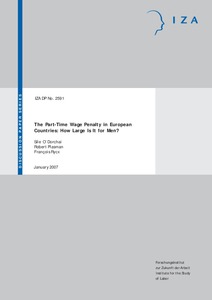The part-time wage penalty in European countries: how large is it for men?
"Economic theory advances a number of reasons for the existence of a wage gap between part-time and full-time workers. Empirical work has concentrated on the wage effects of part-time work for women. For men, much less empirical evidence exists, mainly because of lacking data. In this paper, we...
| Main Authors: | , , |
|---|---|
| Institution: | ETUI-European Trade Union Institute |
| Format: | TEXT |
| Language: | English |
| Published: |
Bonn
2007
IZA |
| Subjects: | |
| Online Access: | https://www.labourline.org/KENTIKA-19292670124910108529-The-part-time-wage-penalty-in-.htm |
| _version_ | 1771659901001531394 |
|---|---|
| author | O'Dorchai, Sîle Plasman, Robert Rycx, François |
| author_facet | O'Dorchai, Sîle Plasman, Robert Rycx, François |
| collection | Library items |
| description | "Economic theory advances a number of reasons for the existence of a wage gap between part-time and full-time workers. Empirical work has concentrated on the wage effects of part-time work for women. For men, much less empirical evidence exists, mainly because of lacking data. In this paper, we take advantage of access to unique harmonised matched employer-employee data (i.e. the 1995 European Structure of Earnings Survey) to investigate the magnitude and sources of the part-time wage penalty for male workers in six European countries (i.e. Belgium, Denmark, Ireland, Italy, Spain, and the UK). Findings show that the raw gap in hourly gross pay amounts to 16 per cent of male part-timer’s wage in Spain, to 24 per cent in Belgium, to 28 per cent in Denmark and Italy, to 67 per cent in the UK and to 149 per cent in Ireland. Human capital differences explain between 31 per cent of the observed wage gap in the UK and 71 per cent in Denmark. When a larger set of control variables is taken into account (including occupation, industry, firm size, and level of wage bargaining), a much smaller part of the gap remains unexplained by differences in observed characteristics (except in Italy). Overall, results suggest that policy initiatives to promote lifelong learning and training are of great importance to help part-timers catch up. Moreover, except for Italy, they point to a persisting problem of occupational and sectoral segregation between men working part-time and full-time which requires renewed policy attention." |
| format | TEXT |
| geographic | EU countries |
| id | 19292670124910108529_e34f2ee3a6fe40e4848569847d3579fc |
| institution | ETUI-European Trade Union Institute |
| is_hierarchy_id | 19292670124910108529_e34f2ee3a6fe40e4848569847d3579fc |
| is_hierarchy_title | The part-time wage penalty in European countries: how large is it for men? |
| language | English |
| physical | 32 p. Digital |
| publishDate | 2007 |
| publisher | Bonn IZA |
| spellingShingle | O'Dorchai, Sîle Plasman, Robert Rycx, François men part time employment statistics wage differential wages The part-time wage penalty in European countries: how large is it for men? |
| thumbnail | https://www.labourline.org/Image_prev.jpg?Archive=117408093568 |
| title | The part-time wage penalty in European countries: how large is it for men? |
| topic | men part time employment statistics wage differential wages |
| url | https://www.labourline.org/KENTIKA-19292670124910108529-The-part-time-wage-penalty-in-.htm |

